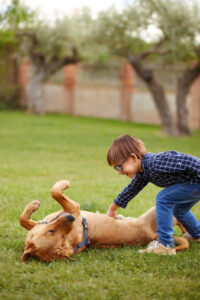
Let’s explore more about intestinal obstruction in dogs and cats.
A gastrointestinal foreign body is an item that dogs and cats can pass down the esophagus but is unable to pass through the stomach or the intestinal tract. These are items that a pet can swallow but are not digestible. If the object is small enough, your pet can pass it through its gastrointestinal system. If the object is too large to simply pass through, however, it can cause an obstruction. Symptoms of this typically include loss of appetite, vomiting, diarrhea, and depression. Let’s explore more about intestinal obstruction in dogs and cats.
Signs/Symptoms of Intestinal Obstruction
The clinical signs of a pet swallowing a foreign body may vary and range from no signs to symptoms of depression and shock. Notable clinical signs include nausea, loss of appetite, lethargy, and depression. Vomiting is a prevalent clinical sign. Diarrhea can often occur, as well. Unfortunately, if the foreign item cannot pass into the animal’s intestine, it can stay stuck in the stomach causing chronic vomiting.
If the object is able to pass through the stomach, but gets stuck in the intestines, it can completely block your pet’s intestine. When this happens, the blood supply of the surrounding intestine can be compromised and the intestines may deteriorate and worsen rapidly. Even if veterinary attention is given at this late stage, your pet is still at significant risk. So, it’s always crucial that you seek veterinary advice immediately.
Diagnosis
A veterinarian diagnoses intestinal obstruction in dogs and cats based on the clinical signs, symptoms, and possible history of ingesting a foreign body. Sometimes the pet owner may have witnessed this situation, making the doctor’s diagnosis easier. In addition, the object may be felt via the animal’s abdominal wall, based on the foreign body’s size and location and how slim the pet is.
It will also be necessary to take x-rays of your pet’s abdomen to determine the presence and location of a foreign body in the gastrointestinal tract. However, some foreign bodies are not transparent on X-rays, and other diagnostic images like an ultrasound might be needed. Bloodwork will also be performed to check your pet’s overall health and for any signs of systemic infection or dehydration.
Prevalent Dog Foreign Bodies
Dogs are often more impacted than cats. Puppies are also susceptible to swallowing foreign items because they play or chew on toys and other products they encounter. The most common types of foreign bodies include squeaky toys, plastic balls, socks, stones, underwear, bones, and significant fruit stones. That isn’t to say these are the only things we’ve seen dogs eat! Any non-food item can cause an obstruction, and you must always be mindful of what your dog has easy access to. Irregularly shaped items like stones or sharp products damage the dog’s intestine or stomach lining.
Prevalent Cat Foreign Bodies
For cats, the majority of foreign bodies are linear or string-like. This may be a Christmas wrapping ribbon or a string wrapped around a meat joint. Cats might also play with a cotton reel and accidentally swallow the attached needle. Not all linear foreign bodies end up in the stomach or intestines. Some might become wrapped around a cat’s tongue. Since they can damage a cat’s stomach or intestines, peritonitis can occur, so it must be dealt with immediately.
Treatment
Even though some foreign bodies are tiny enough to slide along the intestine on their own or with a little help from some IV fluid therapy, many will need removal. Surgical or other procedures can be utilized to eliminate foreign bodies from the stomach. Stabilizing an animal before a gastroscopy or surgery is often essential to eliminate the foreign body. Often times pets with foreign bodies come in dehydrated and need IV fluids before surgery can be performed. Other appropriate medications like gastro-protectants or antiemetics might be given before or after any surgery.
HERE AT MOUNT CARMEL ANIMAL HOSPITAL, WE’LL TREAT YOUR PETS LIKE FAMILY!
Mount Carmel Animal Hospital has been serving the Northern Baltimore/Southern York community for over 30 years and is proud to be an independently operated, small animal practice committed to excellence in veterinary medicine and client service. From grooming to wellness services, along with Canine Life Skills Training Courses, and surgical procedures, we have the expertise that will best serve the needs of you and your pet. Contact us at 410-343-0200 and follow us on Facebook!
